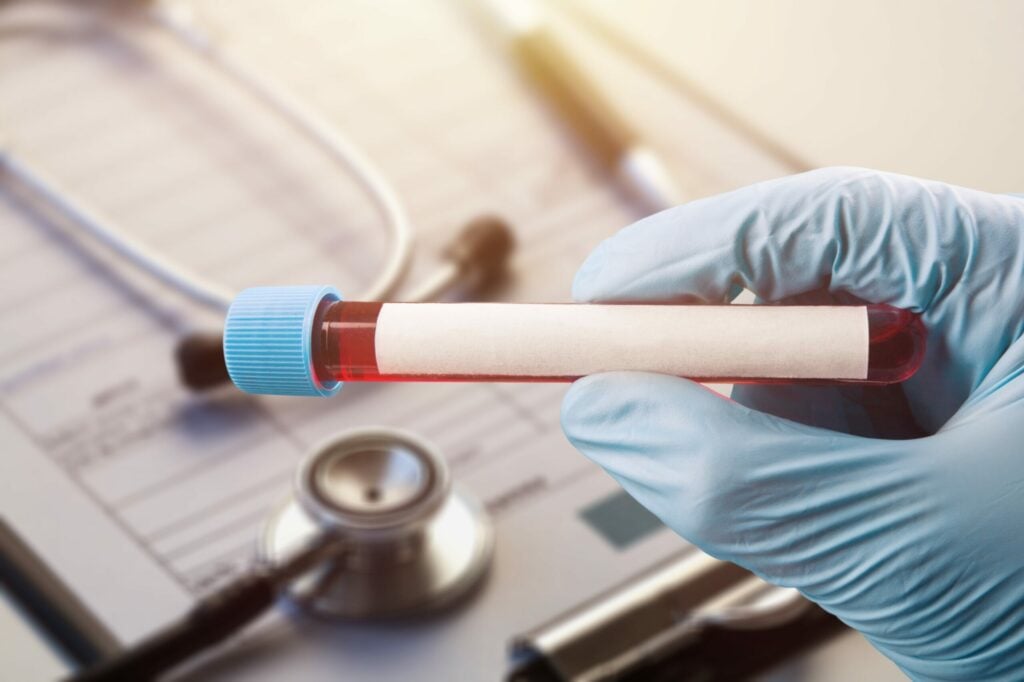Mission
Researchers around the world continue to work tirelessly to advance understanding of ALS and discover effective treatments for this devastating disease. However, a crucial component is still missing: biomarkers. Biomarkers can be used to rapidly diagnose ALS and monitor disease progression as well as to demonstrate activity of test therapeutics and track treatment response. Limited availability of well-characterized patient biofluid samples is a common barrier to biomarker development.

Research
In 2021, Target ALS launched a natural history study to generate the most comprehensive collection of longitudinal biofluid samples and data from at least 800 ALS and 200 healthy control cases. The multi-center study is conducted by the Target ALS Biofluid Consortium, recently expanded to comprise 14 ALS clinics located around the globe, and growing. We’ve reached our 2024 goal with 180 participants enrolled, including our first non-U.S. site in Bogotá, Colombia—marking a significant milestone in advancing ALS research. The study includes collection of detailed clinical and demographic information, speech and respiratory functional data, multiomic datasets, and longitudinal biofluid collection of CSF, blood, and urine. De-identified biofluid samples are currently available for request from 113 participants – 51 healthy controls and 62 participants with ALS.
Outreach and Diversity
We are deeply committed to finding a cure for all patients. Lack of research in diverse populations and underrepresented communities impedes progress in understanding the cause of ALS. Target ALS sponsors several programs to fill this gap. First, we are expanding our biofluid consortium to include 10 international clinics with access to diverse patient populations. Second, in collaboration with the Chan Zuckerberg Initiative and Barrow Neurological Institute, we are creating outreach programs for patients in rural communities to participate in research through a simple at-home questionnaire and blood sample kit. Third, we are providing travel reimbursement to allow patients to easily access ALS clinics to participate in the Natural History Study.
Clinical Sites
The Biofluid Consortium involves the following clinical centers:
- Barrow Neurological Institute, Phoenix, AZ (Coordinating site)
- Site Principal Investigator: Shafeeq Ladha, MD
- Core Director: Robert Bowser, Ph.D.
- Columbia University, New York, NY (led by Neil Shneider, MD, PhD and Matthew Harms, MD)
- Mayo Clinic, Jacksonville, FL (led by Bjorn Oskarsson, MD)
- University of California, San Diego (UCSD), San Diego, CA (led by John Ravits, MD)
- Washington University, St Louis, MO (led by Cindy Ly, MD, PhD and Tim Miller, MD, PhD)
- Georgetown University, Washington DC (led by Brent Harris, MD, PhD and Nick Streicher, MD)
- University of Washington, Seattle WA (led by Michael Weiss, MD)
- Northwestern University, Chicago, IL (led by Senda Ajroud-Driss, MD)
- Massachusetts General Hospital, Boston, MA (led by Mark Garret, MD)
- Instituto Roosevelt, Bogotá, Colombia (led by Martha Peña, MD)
- Hebrew University Jerusalem, Israel (led by Marc Gotkine, MD)
- Baylor College of Medicine, Houston, TX (led by Lydia Sharp, MD and James Orengo, MD, PhD)
- University of Puerto Rico (led by Valerie Wojna, MD and Brenda Deliz Roldan, MD)
Access to Target ALS Core Resources
As with all the core resources created by Target ALS, samples and data will be accessible to researchers worldwide, with no-strings-attached. The goal of this core is to provide access via a conflict-free and expeditious sample request process. De-identified biofluid samples are currently available for request from 113 participants – 51 healthy controls and 62 participants with ALS. Subject data including clinical, demographic, digital measures of function, and WGS is currently available in the Target ALS Data Portal. Additional multi-omic datasets and neurofilament light levels will become available by end of 2024.. Subject data including clinical, demographic, multi-omic datasets, and neurofilament light levels will become available via the Target ALS Data Portal. These data can be mined along with data from our Postmortem Tissue Collection.
To request samples, please click here to complete the form. Please note that we have a new application portal. Click here to learn more.
Sample requests will be approved by an Independent Review Committee on a once-monthly basis, followed by a short virtual meeting to discuss the sample needs and research plan with each investigator. A Materials Transfer Agreement (MTA) will be executed upon approval of the request.
Confidentiality of investigator’s data, research, and intellectual property will be strictly honored.
Target ALS does not seek ownership of any intellectual property or financial gains that result on the
basis of its funding or in-kind contributions.
For more information about the Target ALS Longitudinal Biofluids Core, contact Amy Easton, PhD, Sr. Director of Scientific Programs, (amy.easton@targetals.org) or Laura Dugom, MPH, Clinical Research Scientist (laura.dugom@targetals.org)
To donate biofluids and be a part of advancing ALS Research CLICK HERE
New Target ALS Application Portal
We are in the process of changing our online grant application portal.
- You will need to create a new user account, called a Blackbaud ID, even if you have applied to our grants in the past.
- You will be able to share your applications with co-applicants (consortium members) or other key stakeholders in your organization.
- If you have a current Target ALS grant, you will not see it in this new application portal (we’re working on unifying them).
- Add noreply@yourcause.com to your safe senders list to make sure you receive our emails and notifications.

